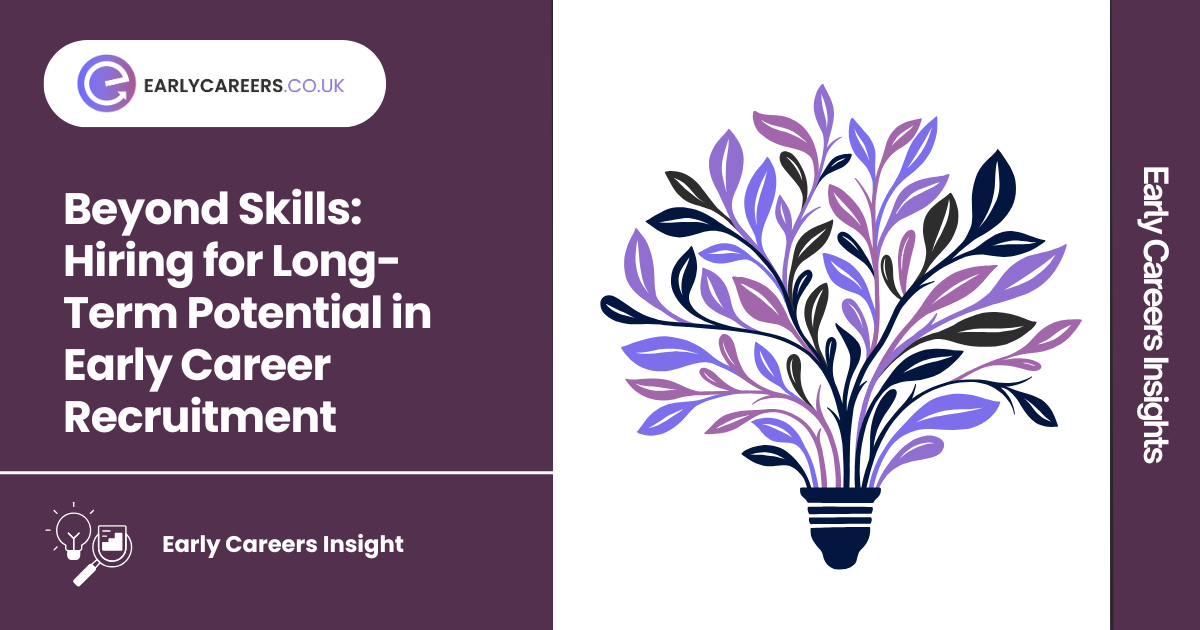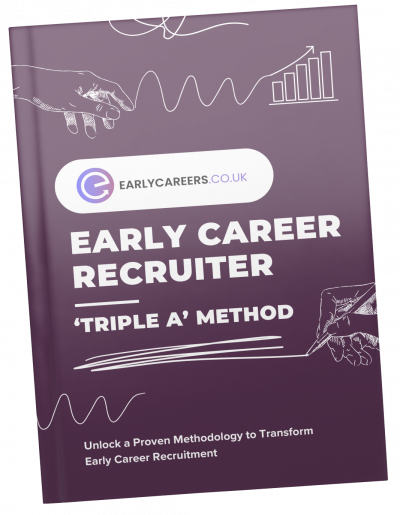
Beyond Skills: The Key to Valuable Early Career Recruitment

Many early career recruitment processes still prioritise qualifications and past experience, focusing on grades, CVs, or whether someone has completed a formal internship. But this approach often overlooks what really matters when attracting young people into meaningful roles: aspiration, potential and purpose.
Young people entering the workforce through apprenticeships, school leaver roles or first jobs may not have a long list of experiences, but they bring with them something equally valuable, a strong desire to learn, grow and make a difference. When recruitment is too focused on credentials, it risks missing the individuals who will thrive in the long term.
Why Hiring for Potential Matters in Early Career Recruitment
Young candidates may lack professional experience, but they bring strengths that can be difficult to teach:
- Adaptability – They are quick to adjust and comfortable learning new things on the job.
- Curiosity – They ask questions, challenge assumptions and bring fresh perspectives.
- Intrinsic motivation – They are eager to prove themselves and build a future.
When employers look beyond traditional markers of ability, they open the door to young people who are driven by purpose and potential.
What Gets Missed in Traditional Early Career Recruitment
Many young candidates are rejected before their application is even read, not because they lack potential, but because they don’t tick enough conventional boxes. For example:
- A school leaver with an analytical mindset might be overlooked for a tech apprenticeship because they did not take computing at school.
- A self-taught creator could be passed over for a digital marketing role because they have no formal qualifications.
- A young person who has helped run a family business might be dismissed for lacking ‘work experience’.
Yet, research consistently shows that those with strong learning agility are more likely to become high performers, regardless of their background. The most valuable early career recruits are often those with the hunger to grow, not just the right words on a CV.
How to Identify High-Potential Early Career Candidates
Rather than relying on grades or specific experiences, employers should look for behaviours and mindsets that indicate future success. Here are five ways to do that.





1. Look for Growth Mindsets (Not Just Hard Skills)
Young people with a growth mindset believe they can improve through effort and learning.
Rather than asking, “What experience do you have?”
Ask, “Tell me about a time you had to learn something new quickly, how did you go about it?”
What to look for:
- Openness to feedback
- Willingness to embrace challenges
- A track record of learning new skills independently
Why it works: A growth mindset is a strong predictor of long-term development. It helps identify candidates who will embrace learning, adapt quickly and remain resilient in the face of new challenges.
2. Use Scenario-Based Assessments Instead of Just CVs
Traditional CVs don’t capture problem-solving, creativity or adaptability. Use practical exercises to assess how a young person thinks.
For example:
- A marketing applicant could respond to a brief for a fictional campaign.
- A finance apprentice could work through a simple budgeting task.
- A customer service candidate could be given a common scenario to respond to.
Why it works: Scenario-based tasks show how candidates think and react, rather than what they’ve done before. This creates fairer opportunities for those without prior experience.
3. Prioritise Cultural & Value Fit Over “Perfect” Credentials
Young people who connect with your mission are far more likely to stay, grow and contribute meaningfully. Instead of only checking qualifications, explore what motivates them.
Ask:
- “What drew you to this role?”
- “What kind of impact do you hope to make at work?”
- “What about our company stands out to you?”
Why it works: When young hires believe in what the organisation stands for, they are more engaged, more loyal and more likely to succeed long term.
4. Use Structured Interviews to Reduce Bias
Informal interviews often favour those who are confident or familiar with professional settings. Structured interviews give young candidates a fairer chance to show their potential.
Best practice:
- Use the same questions for every candidate.
- Focus on problem-solving, adaptability and values.
- Score responses based on clear criteria, not gut feeling.
Why it works: Structured interviews reduce unconscious bias and give all candidates, especially those new to the workforce, a more equal footing.
5. Support Young People from Day One.
Hiring for potential is only the first step. To truly unlock that potential, young people need structured, ongoing support once they’re through the door. Without it, even the most motivated candidates can become disengaged or overwhelmed.
To keep young talent engaged and progressing, focus on:
- Clear onboarding – Help them understand what to expect and where to go for support.
- Regular check-ins – Offer feedback, encouragement and space to ask questions.
- Visible progression – Show them what the next step looks like and how to get there.
- Pastoral support – Recognise that many apprentices are in their first workplace and may need help navigating professional life.
- Mentorship – Pair them with someone who understands the challenges and can offer guidance.
Why it works: young people thrive when they feel supported, heard and valued. The right environment builds confidence, boosts retention and allows young people to grow into long-term contributors.
Why This Matters More Than Ever
Across the early careers landscape, employers are rethinking how they identify and assess talent. Many are moving away from narrow academic filters and instead placing greater emphasis on mindset, values alignment and future potential.
By shifting towards inclusive, purpose-led approaches, organisations are widening access without compromising on quality. They are building stronger pipelines by focusing on what truly matters, not just where someone has been, but where they can go.
Hiring for aspiration rather than experience isn’t about lowering the bar. It’s about changing what you measure, so you can spot potential where others might not look.
Rethinking Early Career Recruitment
The way employers assess and support early career talent has a lasting impact. By focusing on potential, alignment and long-term growth, you create opportunities for young people who are ready to contribute, not just fill a role.
When candidates are assessed fairly, supported from day one and connected to your mission, your early career recruitment becomes a driver of retention, engagement and future leadership.
📢 Next Steps
Want to refine your early career hiring strategy? Download our Triple A Methodology to start hiring for aspiration, not just experience today. 🚀

Download the Triple A Method and start doing early careers recruitment with purpose
This free guide introduces the Triple A framework. It is a structured approach to attracting early career candidates who align with your values and see long-term potential with your organisation.
It gives you a practical starting point to improve attraction and reduce early dropouts by focusing on alignment, engagement and aspiration. Whether you deliver it in-house or work with us, this method will help you think more strategically about youth recruitment.

Share
Facebook
Twitter
LinkedIn
Telegram
Tumblr
WhatsApp
VK
Mail